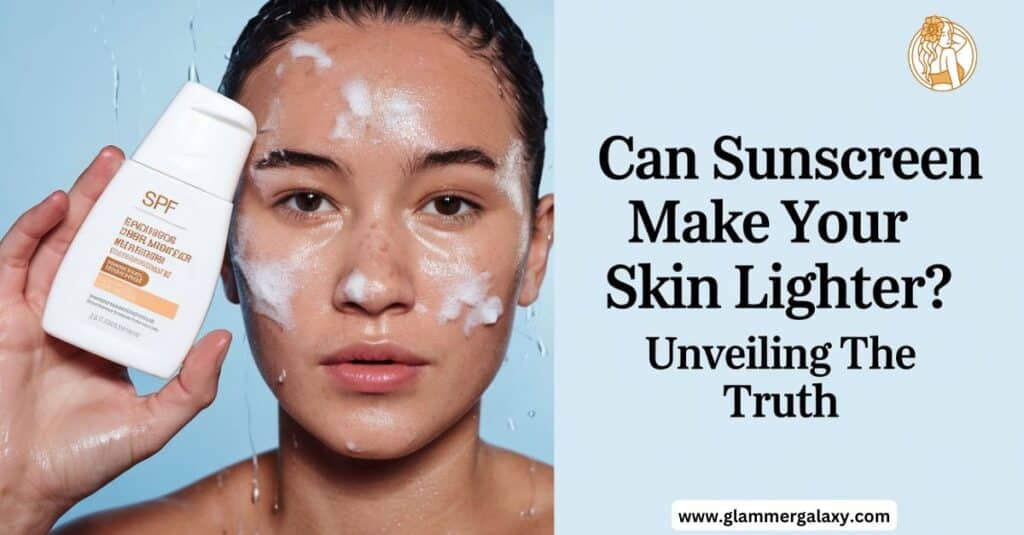In the world of skincare, few products have garnered as much attention and controversy as sunscreen. While its primary purpose is to protect our skin from harmful UV radiation, a persistent question lingers: Can sunscreen make your skin lighter?
This comprehensive guide will delve deep into the science of skin pigmentation, the mechanics of sunscreen, and the truth behind its alleged skin-lightening effects.
The Skin You’re In: Understanding Your Largest Organ
Before we tackle the sunscreen debate, let’s take a closer look at the canvas it works on – your skin.
Layers of Life: The Skin’s Structure
Your skin is composed of three main layers:
- Epidermis: The outermost layer, home to melanocytes
- Dermis: Contains blood vessels, hair follicles, and sweat glands
- Hypodermis: The deepest layer, primarily composed of fat cells
The epidermis is where the magic of skin color happens. Here, specialized cells called melanocytes produce melanin, the pigment responsible for your skin tone.
Melanocytes: Your Skin’s Color Factories
Melanocytes are the unsung heroes of your skin. These cells produce melanin, which not only gives your skin its unique color but also provides natural protection against UV radiation. The amount and type of melanin produced determine your skin tone:
- Eumelanin: Brown and black pigments
- Pheomelanin: Red and yellow pigments
“Melanin is nature’s sunscreen. It’s a remarkable molecule that absorbs UV radiation and dissipates it as heat, protecting the skin from damage.” – Dr. Emma Guttman-Yassky, Dermatologist
The balance between these two types of melanin contributes to the vast array of human skin colors we see around the world.
The Sun’s Role in Skin Darkening
When your skin is exposed to UV radiation, it triggers a fascinating process:
- UV rays penetrate the skin
- Melanocytes are stimulated
- Melanin production increases
- Skin becomes darker (tans) as a protective response
This natural tanning process is your body’s way of shielding itself from further UV damage. However, prolonged exposure can lead to skin damage, premature aging, and increased risk of skin cancer.
Sunscreen Demystified: More Than Just SPF
Now that we understand how skin color works, let’s explore the shield we use against UV radiation – sunscreen.
Active Ingredients: Physical vs. Chemical Blockers
Sunscreens fall into two main categories:
- Physical (Mineral) Sunscreens
- Key ingredients: Zinc oxide, titanium dioxide
- Work by reflecting and scattering UV rays
- Chemical Sunscreens
- Key ingredients: Oxybenzone, avobenzone, octisalate
- Work by absorbing UV rays and converting them to heat
| Sunscreen Type | Pros | Cons |
| Physical | – Immediate protection- Less likely to cause skin irritation | – Can leave a white cast- May feel heavy on skin |
| Chemical | – Easier to spread- Invisible on skin | – May cause skin irritation- Takes 20-30 minutes to become effective |
Beyond SPF: Understanding UV Protection
When choosing a sunscreen, it’s crucial to look beyond just the SPF number:
- SPF (Sun Protection Factor): Measures protection against UVB rays
- UVA Protection: Look for “broad-spectrum” on the label
- UVB Protection: Indicated by the SPF number
“A common misconception is that a higher SPF provides significantly more protection. In reality, SPF 30 blocks about 97% of UVB rays, while SPF 50 blocks about 98%.” – Skin Cancer Foundation
It’s important to note that UVA rays penetrate deeper into the skin and are primarily responsible for premature aging and some forms of skin cancer. This is why broad-spectrum protection is crucial for comprehensive sun protection.
The Lightening Effect: Myth or Reality?
Now, let’s address the burning question: Can sunscreen actually make your skin lighter?
The Indirect Relationship
Sunscreen doesn’t directly lighten your skin. However, it can indirectly affect your skin tone by:
- Preventing sun-induced darkening
- Allowing existing dark spots to fade naturally
- Reducing inflammation that can lead to post-inflammatory hyperpigmentation
This indirect effect is what often leads people to believe that sunscreen has lightening properties.
See Also : Showering After an Ice Bath Myth or Necessity
Case Study: The Sunscreen Experiment
A study published in the Journal of Clinical and Aesthetic Dermatology followed 50 participants with various skin tones over 12 weeks. They were instructed to apply broad-spectrum SPF 30 sunscreen daily.
Results:
- 78% reported a more even skin tone
- 62% noticed a reduction in dark spots
- 0% experienced actual skin lightening beyond their natural tone
This study highlights that while sunscreen can help maintain and even out your natural skin tone, it doesn’t actively lighten skin beyond its baseline color.
The Science Behind Sun Protection and Skin Tone
To understand why sunscreen doesn’t directly lighten skin, we need to look at the mechanisms of melanin production:
- Basal Melanin Production: This is your skin’s natural, genetically determined melanin level.
- UV-Induced Melanin Production: This is the additional melanin produced in response to UV exposure.
Sunscreen primarily affects the second type by preventing UV rays from triggering excess melanin production. It doesn’t interfere with your skin’s basal melanin levels, which is why it can’t make you lighter than your natural skin tone.
Unintended Consequences: When Sunscreen Affects Pigmentation
While sunscreen doesn’t directly lighten skin, certain ingredients can influence pigmentation in unexpected ways.
Chemical Sunscreens and Hormone Disruption
Some chemical sunscreens, particularly those containing oxybenzone, have been linked to hormone disruption. This can potentially affect melanin production, leading to:
- Hyperpigmentation in some individuals
- Hypopigmentation in others
These effects are not universal and depend on individual skin chemistry and sensitivity.
Nanoparticles in Physical Sunscreens: A Double-Edged Sword
Nanoparticles in some physical sunscreens can penetrate the skin and potentially interact with melanocytes. While research is ongoing, some studies suggest that these particles might:
- Interfere with melanin production
- Cause oxidative stress in skin cells
It’s important to note that these effects are not universal and depend on various factors, including individual skin type and the specific formulation of the sunscreen.
Allergic Reactions and Skin Tone
In rare cases, allergic reactions to sunscreen ingredients can cause temporary changes in skin tone:
- Redness and inflammation can make the skin appear darker
- Post-inflammatory hypopigmentation can result in lighter patches
These effects are typically temporary and resolve once the allergic reaction is treated.
You might also like : Does Black Hair Dye Damage Hair? Debunking the Myths
The Whitening Sunscreen Phenomenon
The beauty industry has capitalized on the desire for lighter skin in many cultures, leading to the marketing of “whitening” sunscreens.
Marketing Tactics: Decoding the Labels
Be wary of sunscreens labeled as:
- Whitening
- Brightening
- Tone-evening
These products often contain additional ingredients that may have skin-lightening properties, such as:
- Kojic acid
- Niacinamide
- Vitamin C
While these ingredients can help even out skin tone and reduce dark spots, they don’t fundamentally change your natural skin color.
Analyzing Ingredients in “Whitening” Sunscreens
Let’s take a closer look at some common ingredients in these products:
- Niacinamide (Vitamin B3)
- Helps reduce hyperpigmentation
- Improves skin barrier function
- Does not bleach or lighten natural skin tone
- Vitamin C
- Powerful antioxidant
- Can help fade dark spots
- Boosts collagen production for healthier-looking skin
- Licorice Extract
- Contains glabridin, which may inhibit tyrosinase (an enzyme involved in melanin production)
- Can help reduce the appearance of dark spots
- Arbutin
- A naturally occurring compound found in bearberry plants
- May help reduce melanin production
- Generally considered gentler than other lightening agents
It’s crucial to understand that these ingredients work by targeting excess pigmentation or promoting overall skin health, not by fundamentally changing your natural skin color.
The Psychological Effect: Perception vs. Reality
The belief that sunscreen can lighten skin may be partly due to the psychological effect of consistent use:
- Protected skin appears brighter and more radiant
- Reduced sun damage leads to a more even complexion
- The act of applying sunscreen daily may make users more aware of their skin tone
This increased awareness, combined with the prevention of further darkening, can create the illusion of skin lightening.
Sunscreen and Skin Health: A Balancing Act
While the skin-lightening effects of sunscreen may be overstated, its importance in overall skin health cannot be overstressed.
Vitamin D Synthesis: Finding the Sweet Spot
Sunscreen use can affect vitamin D production, which requires UVB exposure. However, the benefits of sun protection outweigh this concern for most people.
Tips for balancing sun protection and vitamin D:
- Expose arms and legs for 10-15 minutes a few times a week
- Consider vitamin D supplements if recommended by your doctor
- Choose foods rich in vitamin D, such as fatty fish and fortified dairy products
Preventing Hyperpigmentation: Sunscreen’s Superpower
One of sunscreen’s most significant benefits is its ability to prevent and reduce hyperpigmentation:
- Melasma: A condition characterized by brown patches, often triggered by hormones and sun exposure
- Post-inflammatory hyperpigmentation: Dark spots left behind after acne or other skin injuries
- Age spots: Also known as liver spots or solar lentigines
By consistently using sunscreen, you allow your skin’s natural healing processes to work without the constant assault of UV radiation.
Long-term Benefits: Your Future Self Will Thank You
Regular sunscreen use offers numerous long-term benefits:
- Reduced risk of skin cancer, including melanoma, basal cell carcinoma, and squamous cell carcinoma
- Prevention of premature aging, including fine lines, wrinkles, and loss of elasticity
- Maintenance of an even skin tone and reduced appearance of sun spots
Choosing Your Shield: Navigating the Sunscreen Aisle
With countless options available, choosing the right sunscreen can be overwhelming. Here’s a guide to help you make an informed decision:
Factors to Consider
- Skin Type
- Oily skin: Lightweight, non-comedogenic formulas
- Dry skin: Moisturizing, cream-based sunscreens
- Sensitive skin: Physical sunscreens with minimal ingredients
- Lifestyle
- Active outdoor lifestyle: Water-resistant, high SPF formulas
- Office worker: Lightweight, everyday sunscreens
- Climate
- Hot, humid climates: Gel-based, non-greasy formulas
- Cold, dry climates: Moisturizing sunscreens with added skin barriers
Natural vs. Synthetic: Weighing Your Options
| Natural Sunscreens | Synthetic Sunscreens |
| Zinc oxide, titanium dioxide | Oxybenzone, avobenzone, octinoxate |
| Immediate protection | Takes 20-30 minutes to become effective |
| Less likely to cause irritation | May cause skin sensitivity |
| Can leave a white cast | Usually invisible on skin |
| Often reef-safe | Some ingredients may harm marine life |
Tinted Sunscreens: The Best of Both Worlds?
Tinted sunscreens offer several advantages:
- Provide sun protection
- Offer light coverage to even out skin tone
- Reduce the appearance of a white cast
- May contain additional skin-benefiting ingredients
These products can be particularly beneficial for those with darker skin tones who want to avoid the white cast often left by physical sunscreens.
Beyond the Bottle: Holistic Approaches to Even Skin Tone
While sunscreen is crucial for maintaining an even skin tone, a holistic approach can enhance its effects:
Diet and Skincare: You Are What You Eat
Incorporate these skin-loving foods into your diet:
- Tomatoes: Rich in lycopene, which can boost skin’s natural SPF
- Fatty fish: High in omega-3s, which support skin health
- Green tea: Contains polyphenols that may protect against UV damage
- Colorful fruits and vegetables: Packed with antioxidants that fight free radicals
A balanced diet rich in these foods can support your skin’s natural defenses and promote a healthy, radiant complexion.
Complementary Skincare Ingredients
Pair your sunscreen with these powerful ingredients:
- Vitamin C: Brightens skin and boosts sunscreen efficacy
- Niacinamide: Improves skin barrier function and reduces hyperpigmentation
- Hyaluronic acid: Hydrates and plumps skin, reducing the appearance of fine lines
These ingredients can work synergistically with sunscreen to enhance overall skin health and appearance.
The Role of Exfoliation
Regular exfoliation can enhance the effectiveness of your sunscreen by:
- Removing dead skin cells that can trap sunscreen
- Improving product absorption
- Promoting cell turnover for a more even skin tone
Tip: Exfoliate at night to avoid increased sun sensitivity during the day.
Explore this : Does Shea Butter Expire? Keep It Lush!
Sunscreen Myths: Busted!
Let’s debunk some common sunscreen misconceptions:
- Myth: Dark skin doesn’t need sunscreen.
Truth: All skin tones need sun protection to prevent damage and maintain even pigmentation. - Myth: Sunscreen causes vitamin D deficiency.
Truth: The benefits of sun protection outweigh the minimal impact on vitamin D synthesis for most people. - Myth: One application of sunscreen lasts all day.
Truth: Reapply sunscreen every 2 hours, or more frequently if swimming or sweating. - Myth: Higher SPF is always better.
Truth: SPF 30 blocks 97% of UVB rays, while SPF 50 blocks 98%. The difference is minimal beyond SPF 30
. - Myth: Sunscreen makes your skin lighter.
Truth: Sunscreen prevents darkening but doesn’t actively lighten skin beyond its natural tone. - Myth: Waterproof sunscreens exist.
Truth: No sunscreen is truly waterproof. Look for “water-resistant” labels instead. - Myth: You don’t need sunscreen on cloudy days.
Truth: Up to 80% of UV rays can penetrate clouds, making sun protection necessary year-round.
The Future of Sun Protection
The world of sunscreen is continually evolving. Here are some exciting developments to watch:
- DNA repair enzymes: Some sunscreens now include ingredients that help repair UV-induced DNA damage
- Oral sunscreens: Research is ongoing into supplements that can boost the body’s natural UV defenses
- Smart sunscreens: UV-sensitive formulas that change color when it’s time to reapply
- Environmental protection: Sunscreens that shield against pollutants and blue light from digital devices
- Microbiome-friendly formulas: Sunscreens designed to work in harmony with the skin’s natural microbiome
These innovations promise to make sun protection more effective, convenient, and tailored to individual needs.
Expert Corner: Dermatologists Weigh In
We asked leading dermatologists to share their thoughts on sunscreen and skin tone:
“Sunscreen is the most important anti-aging product you can use. It prevents damage that leads to uneven skin tone and premature aging.” – Dr. Marisa Garshick, Board-Certified Dermatologist
“For patients concerned about skin tone, I always emphasize consistent sun protection alongside targeted treatments for hyperpigmentation. Sunscreen is the foundation of any effective skincare routine.” – Dr. Joshua Zeichner, Director of Cosmetic and Clinical Research in Dermatology at Mount Sinai Hospital
“The key to maintaining an even skin tone is prevention. Daily sunscreen use, combined with antioxidants and gentle exfoliation, can make a significant difference in the long run.” – Dr. Shereene Idriss, Board-Certified Dermatologist
These expert opinions underscore the importance of sunscreen in maintaining healthy, even-toned skin.
Embracing Your Skin, Come Rain or Shine
In conclusion, while sunscreen doesn’t actively lighten your skin, it plays a crucial role in maintaining your natural skin tone and overall skin health. By preventing sun damage and allowing your skin to heal, sunscreen can help you achieve a more even, radiant complexion.
Remember:
- Choose a broad-spectrum sunscreen with at least SPF 30
- Apply generously and reapply every 2 hours
- Combine sunscreen use with other sun-protective measures, like seeking shade and wearing protective clothing
- Embrace and protect your natural skin tone, whatever it may be
By understanding the science behind sunscreen and skin pigmentation, you can make informed choices about your skincare routine and enjoy healthy, protected skin for years to come.
Final Thoughts
The quest for lighter skin is a complex issue rooted in cultural, historical, and social factors. While sunscreen can help maintain an even skin tone and prevent sun-induced darkening, it’s important to embrace and celebrate the diversity of human skin colors. True beauty comes in all shades, and the healthiest skin is protected skin, regardless of its tone.
As you navigate the world of skincare and sun protection, remember that the goal is not to change your natural skin color, but to keep your skin healthy, protected, and radiant. With consistent use of sunscreen and a holistic approach to skincare, you can achieve your best complexion while staying true to your natural beauty.

Sarah Williams is an experienced blogger and fashion enthusiast at Glammer Galaxy. With a passion for beauty and style, she shares expert insights on hair trends, nail art, and fashion tips. Her creative flair and years of experience make her a go-to source for all things glam!







